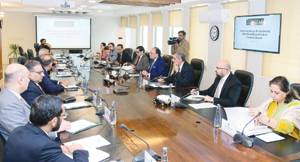
Finance Minister Aurangzeb reaffirms the govt’s commitment to strengthening Pakistan’s investment landscape
Reaffirms the govt’s focus on export-led growth
ISLAMABAD ( WEB NEWS )
Federal Minister for Finance and Revenue, Senator Muhammad Aurangzeb, met with a delegation of the Mutual Funds Association of Pakistan (MUFAP) on Thursday.
The meeting was attended by the Chairman of the Securities and Exchange Commission of Pakistan (SECP) and senior officials from the Finance and Revenue Divisions. The MUFAP delegation was led by Aftab Diwan, Independent Director of MUFAP.

During the meeting, the delegation presented a comprehensive overview of Pakistan’s mutual fund industry and its role in promoting savings, investments, and capital market development. They highlighted that mutual funds play a critical role in channeling savings into productive investments, supporting economic growth, and expanding financial inclusion. The delegation also pointed out that Pakistan’s gross savings rate, currently at 13% of GDP, remains significantly lower than regional peers such as India, which stands at 30%. The discussion covered key policy proposals to strengthen the financial sector. The delegation emphasized the need to develop Infrastructure Funds, allowing private sector participation in essential infrastructure projects. They also advocated for Contributory Pension Scheme Reforms, highlighting the importance of expanding structured retirement savings at the federal level. Additionally, they proposed policy measures to enhance market liquidity for Government Ijarah Sukuks (GIS) by improving institutional participation and introducing open market operations. To encourage retail investor participation, MUFAP recommended reinstating tax credits for mutual fund investments to provide incentives for long-term savings. They also proposed the establishment of a Pakistan Higher Education Savings Fund, modeled after successful global education savings plans, to help families plan for their children’s education.
Finance Minister Senator Muhammad Aurangzeb appreciated MUFAP’s insights and reaffirmed the government’s commitment to strengthening Pakistan’s investment landscape. He directed SECP and relevant authorities to evaluate the proposed reforms and ensure the development of a more robust and inclusive financial ecosystem. The meeting concluded with a shared understanding that a well-regulated and growing mutual fund industry would not only contribute to economic stability but also offer secure and profitable investment opportunities for the public, promoting financial security and sustainable development.
Meanwhile a delegation of Jefferies Investors, led by Ms. Alia Moubayed from Jefferies, called on the Federal Minister for Finance and Revenue, Senator Muhammad Aurangzeb, in Islamabad on Thursday. The delegation included Vasil Nikolov from HBK Investment Management, Khaled Sellami from Barings, Xin Xu from Ashmore, Salman Ahmed from Fidelity, Khurram Sheikh from Jefferies, and Mahmood Ali Shah Bukhari from Ktrade Securities. The delegation discussed Pakistan’s macroeconomic outlook, investment climate, and ongoing economic reforms. They invited the Finance Minister to the Pakistani Investors Day in London, scheduled for May 2025, as part of efforts to strengthen engagement with global investors.
Senator Muhammad Aurangzeb highlighted Pakistan’s economic stabilization, emphasizing the government’s commitment to structural reforms in taxation, energy, state-owned enterprises (SOEs), and privatization. He noted that the economy is now in a stable position in quantitative terms and outlined the government’s proactive approach to fiscal discipline, revenue mobilization, and investment facilitation. The Minister informed the delegation about key tax reforms, including the activation of the National Tax Council to enhance coordination between the federal government and provinces. He elaborated on the expansion of the tax base, with a focus on formally bringing the wholesale, retail, and real estate sectors into the tax net. He also discussed the agricultural income tax, stating that all four provinces have approved the bill, and it is expected to take effect from July 1, 2025. Additionally, he noted that tax policy has been moved from the Federal Board of Revenue (FBR) to the Finance Division, ensuring a more strategic and policy-driven approach.
On the fiscal side, the Minister underscored the government’s rightsizing efforts to control expenditures and manage public finances efficiently. He reaffirmed the government’s focus on export-led growth, stating that all sectors must contribute to a structural shift in Pakistan’s economic model. The discussion also covered capital markets and investment facilitation, with the Minister updating the delegation on ongoing Panda Bond discussions as part of Pakistan’s external financing strategy. He further emphasized the need for tactical support in capacity building, particularly in addressing population growth and climate change, which he termed as critical long-term challenges for Pakistan.
The delegation acknowledged Pakistan’s economic progress and expressed interest in investment opportunities, particularly in capital markets, infrastructure, and emerging sectors. They appreciated the government’s reform agenda and efforts to enhance investor confidence. The Finance Minister reaffirmed the government’s commitment to facilitating foreign investors and welcomed continued engagement with global investment firms. The meeting concluded with a shared understanding to strengthen economic ties and deepen collaboration in financial markets.
